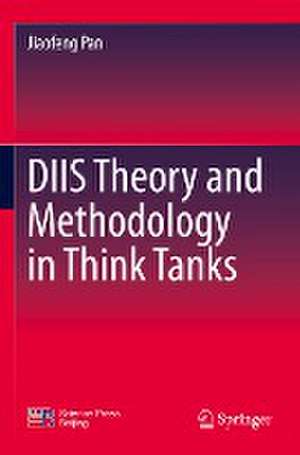DIIS Theory and Methodology in Think Tanks
Autor Jiaofeng Panen Limba Engleză Paperback – 17 mai 2022
| Toate formatele și edițiile | Preț | Express |
|---|---|---|
| Paperback (1) | 770.00 lei 6-8 săpt. | |
| Springer Nature Singapore – 17 mai 2022 | 770.00 lei 6-8 săpt. | |
| Hardback (1) | 776.03 lei 6-8 săpt. | |
| Springer Nature Singapore – 16 mai 2021 | 776.03 lei 6-8 săpt. |
Preț: 770.00 lei
Preț vechi: 939.02 lei
-18% Nou
Puncte Express: 1155
Preț estimativ în valută:
147.41€ • 151.60$ • 122.29£
147.41€ • 151.60$ • 122.29£
Carte tipărită la comandă
Livrare economică 19 februarie-05 martie
Preluare comenzi: 021 569.72.76
Specificații
ISBN-13: 9789811606205
ISBN-10: 981160620X
Ilustrații: XIX, 316 p. 70 illus., 68 illus. in color.
Dimensiuni: 155 x 235 mm
Greutate: 0.48 kg
Ediția:1st ed. 2021
Editura: Springer Nature Singapore
Colecția Springer
Locul publicării:Singapore, Singapore
ISBN-10: 981160620X
Ilustrații: XIX, 316 p. 70 illus., 68 illus. in color.
Dimensiuni: 155 x 235 mm
Greutate: 0.48 kg
Ediția:1st ed. 2021
Editura: Springer Nature Singapore
Colecția Springer
Locul publicării:Singapore, Singapore
Cuprins
Part 1 Logical System of Think Tank Research.- Chapter 1 Introduction to the Fundamental Logical System of Think Tank Research.- Chapter 2 Evolution and Exploration of Think Tank Research Methods.- Part 2 DIIS Theory and Methodology of Think Tanks.- Chapter 3 DIIS Theory and Methodology of Think Tanks.- Part 3 Research Methodological System of DIIS SubjectsChapter 4 DIIS Method of Scientific and Technological Roadmap.- Chapter 5 DIIS Method of Scientific and Technological Evaluation.- Chapter 6 DIIS Method of Third-Party Evaluation.- Part 4 System of Organizing and Building DIIS.- Chapter 7 System of Organizing and Building DIIS.- Part 5 Research Methods and Tools of DIIS.- Chapter 8 Innovative Method of DIIS -- Identification of Source Technology.- Chapter 9 Common Research Methods and Tools.- Chapter 10 Common Databases.
Notă biografică
Jiaofeng Pan, is Professor, President of the Institutes of Science and Development, Chinese Academy of Sciences (CASISD), Co-Director of China Innovation Strategy and Policy Research Center funded by Research Office of the State Council and CAS, Chairman of the Chinese Association of Development Strategy Studies, Vice President of China Law Association on Science and Technology, Vice Chairman of China Association of Scientific and Technological Achievements Management. He also served as Deputy Secretary General of CAS, Director General of Bureau of Planning and Strategy, CAS, Director General of Bureau of Development and Planning, CAS, Deputy Director General of General Office, CAS, and Director of Institute of Policy and Management, CAS. His research focuses on S&T strategic planning, innovation policy, think tank theory and method research. He participated in the research and drafting of national S&T planning and emerging industry planning, aswell as the research and relevant documents drafting of national S&T system reform. He has presided dozens of major decision-making advising research projects including top-level design of innovation-driven development strategy and third-party assessment of relevant national innovation policies. He has organized the serial strategic research: “China’s S&T Roadmaps to 2050” (“Innovation 2050” for short), with serial reports which have been published successively. As the general research team leader, he has organized and published Vision 2020: The Emerging Trends in S&T and Strategic Option of China. He has involved in the work of strategic research, as well as formulating and implementing the major reform measures of CAS such as “Knowledge Innovation Program”, “Innovation 2020”, and “Pioneer Initiatives”.
Textul de pe ultima copertă
This book provides the readers with the overall latest research on think tanks, summarizing the characteristics of think tanks, revealing the general laws and internal logic of think tank research, applying systems, dialectical views and operations research, system theory, and cybernetics to the problems existing in the research work of think tanks at home and abroad. Based on problem-oriented, evidence-oriented and scientific orientation, this book systematically considers the methodology of think tank research, proposes the DIIS theoretical method system of think tank research, defines the standardization process of think tank research and the quality standard of think tank DIIS, and gives corresponding DIIS to the actual think tank research problem. The method aims to improve the scientificity, effectiveness, and reliability of the research results of think tanks, provide systematic theoretical analysis for think tank research, promote the professional development of think tanks, and better serve the modernization of national governance systems and governance capabilities. This book presents new theoretical and research method support and reference that contribute to macro decision-making departments, management departments, scientific research institutes, universities, and enterprises think tank research related departments, strategic decision makers, think tank managers, think tank researchers, and readers interested in think tanks reading and using. Finally yet importantly, this book embodies the research of think tank as the object of investigation, jumping out of specific social conditions, using systemic thoughts, thinking about the more general role and characteristics of think tanks from the theoretical level, important theoretical issues such as principles and logic systems that think tank research should follow.
Caracteristici
Summarizes the characteristics of think tanks and reveals the general laws and internal logic of think tank research Applies systems and dialectical views, operations research, system theory, and cybernetics to the problems existing in the research work of think tanks at home and abroad Defines the standardization process of think tank research Proposes the DIIS theoretical method system and the quality standard of think tank DIIS, giving corresponding DIIS to the actual think tank research problem
